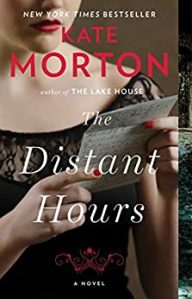 Kate Morton is not a new author, but when I picked up this book, she was new to me. I was intrigued by the plotline, which seemed to be part Jane Eyre, part Rebecca, and the setting, of course – the story was split between London and a crumbling ancestral manor in Kent. As anyone who’s spent five minutes in my company, virtually or in person, will tell you, I love anything that can transport me to England. I’ve spent time in both London and Kent, and this story took me right back there.
Kate Morton is not a new author, but when I picked up this book, she was new to me. I was intrigued by the plotline, which seemed to be part Jane Eyre, part Rebecca, and the setting, of course – the story was split between London and a crumbling ancestral manor in Kent. As anyone who’s spent five minutes in my company, virtually or in person, will tell you, I love anything that can transport me to England. I’ve spent time in both London and Kent, and this story took me right back there.
The story revolves around Edie, a young woman working for a publisher in 1990s London. Edie maintains a loving but somewhat distant relationship with her parents, neither of whom seem to have gotten over the loss of Edie’s younger brother when he was just a toddler. She’s spent her life wondering if they only love her because as her parents it’s their obligation, and she knows very little about their lives before her. Then one day, as they’re preparing to sit down to their weekly family supper, a letter – dated five decades earlier – is delivered to Edie’s mother, sparking a reaction Edie has never seen. Her mother cries.
Shaken by the reaction and intrigued by the mystery of the letter, which hints at a history Edie’s mother lived and about which Edie had no idea, Edie uses her connections at the publishing house to trace the source of the letter to Milderhurst Castle, formerly owned by Raymond Blythe – writer of the tale that inspired Edie, as a child, to pursue a career in writing. Raymond Blythe is long dead, but the castle is now inhabited by his three elderly daughters: Percy, Saffy, and Juniper. Spinsters Percy and Saffy have devoted their lives to caring for their younger half-sister Juniper, whose sanity was irrevocably lost one night in 1941 when she realized her fiancé wasn’t coming for her after all. And as Edie gets to know the sisters, she learns that the crumbling walls of Milderhurst have been keeping secrets more sinister than those involving her mother’s childhood.
If you’re looking for a quick read, something that can be knocked out in an afternoon, this isn’t the book for you. It’s slow, sometimes frustratingly so, but it was always obvious that each carefully-crafted detail was necessary to the story. And though it echoes the classic Gothic novels of the 19th centuries, in some ways this book was several years ahead of its time – it employs the dual-timeline technique that has become so popular in recent years, switching between the World War II era and the 1990s. Multiple characters tell the tale from their own perspectives, ensuring that the reader never quite knows what’s reality and what’s perception. Lovers of traditional Gothic novels and those with the patience for an extensive cast of unreliable narrators and sprawling detail will enjoy The Distant Hours.